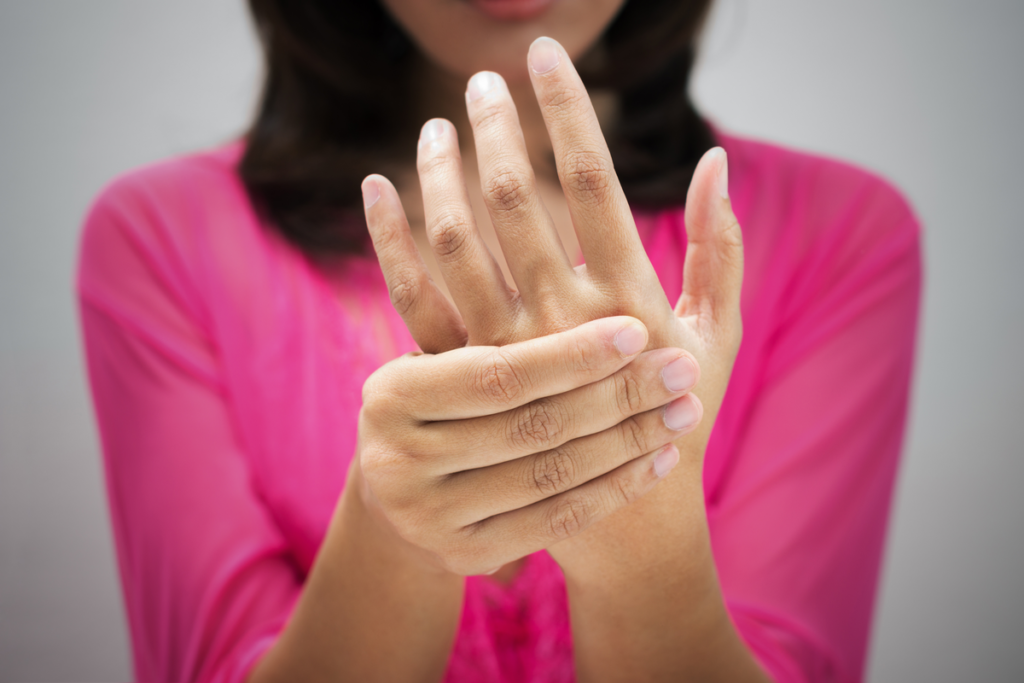It’s happened to all of us at some time. You wake early in the morning to go to the bathroom and you discover that your hand or arm is completely numb. The tingling sensation can be mild or intense, and this inactivity in your limbs can sometimes make you anxious. If this is something that happens to you, read on, as we’re going to explain why your hands go to sleep when you do.
Contrary to what you might think, most cases are nothing to worry about. It’s simply due to a compression of the nerves that temporarily prevent the sending of electrical signals. The medical term for this is paresthesia, a condition that can also be generated without any external physical compression.
Numbness in the hands when sleeping
Numbness in the hands when sleeping, or paresthesia, is an extremely common condition that affects people of all ages. It’s characterized by a feeling of stiffness and tingling that doesn’t impede the flexibility of the joints.
Parasthesisa is generated when you compress your arm or your hand while you sleep. If part of your body presses on the limb, the blood supply and the communication of some nerves are interrupted. It can also be generated by prolonged inactivity.
A change in body position can also generate symptoms. For example, if you stretch one of your arms, and it falls slightly over the edge of the bed. This is usually temporary and gradually disappears until its mobility is completely restored.
On occasions, this condition can be a symptom of an underlying problem. However, the explanation we’ve given is by far the most likely. Nevertheless, if this isn’t the case, you could be developing the episodes due to one of the following conditions:
Peripheral neuropathy
Apparently, this is one of the main causes of why your hands go to sleep when you’re sleeping. Peripheral neuropathy is the interruption of communication in the nerves of the peripheral system, causing numbness and tingling in the hands and feet.
Its prevalence in the population is around two point four percent. However, in adults over 55, the number rises to eight percent according to the AAFP. There are many explanations for this condition. For instance, if you’re diabetic, have suffered an infection, have been exposed to toxins, or have had a recent trauma, you may develop it.
Thoracic outlet syndrome
This condition is also known as thoracic outlet compression syndrome because there are actually several disorders with these characteristics in common. It occurs when the nerves or blood vessels between the first rib and the clavicle become compressed.
This causes numbness in the hands, which can spread to the entire arm and part of the neck. It’s relatively common, especially among those who spend several hours in front of a computer. The reason for this is that the head tends to move forward a little in relation to the body, which creates pressure in the area.
Cervical neck stenosis
This condition is also known as cervical spinal stenosis or spinal stenosis. It’s caused by narrowing in the spaces of the spinal column which means that there’s little space for the nerves. When this happens, they exert pressure and lead to communication errors.
Most patients don’t develop symptoms except for numbness or tingling in the fingers and toes. This worsens when lying down because the position of the spine and neck creates more pressure. Many use collars to alleviate this sensation during their hours of rest.
Carpal tunnel syndrome
This is another frequent condition among those who spend a lot of time in front of the screens. It’s estimated that it affects between four percent and five percent of the population worldwide, so it isn’t a rare condition. It’s caused by a compression of the median nerve that passes through the wrist.
Sufferers often experience tingling, numbness, and weakness while they sleep. The syndrome is caused by an anatomical defect in the wrist caused by repetitive movements, injuries, trauma, or other diseases. In fact, carpal tunnel syndrome is one of the most common causes of your hands going to sleep when you’re sleeping.
We could continue this list to include in excess of one hundred conditions. However, these four are undoubtedly the main ones that cause numbness of the extremities when sleeping. Nevertheless, here are some other possible causes.
- Diabetes.
- Spasticity.
- Herpes zoster.
- Panic attacks.
- Mineral deficiency (iron, potassium, sodium, calcium, vitamin B12, and others).
- Intake of some foods.
- Recreational drug intake before bed.
- Migraine with aura.

What to do to avoid hand numbness when sleeping?
Leaving aside the above list, keep in mind what we’ve already mentioned. The answer to why your hands fall asleep when you’re sleeping is due to nerve compressions. To verify if this is the true cause, you can try adopting certain habits during your hours of rest. Among the main ones are:
- Avoid sleeping in the fetal position.
- Don’t put your hand under the pillow when sleeping on your side.
- If you sleep on your stomach, make sure your arms are at your sides. Prevent your whole body from compressing them by placing them under your chest.
- Make sure your whole body is on the same line. Raising or lowering your hands in relation to your head can create numbness.
Another thing you can do, particularly if you spend a lot of time in front of the computer, is to include short breaks of five to ten minutes when you practice small stretching sessions. Massaging your arms and hands before going to sleep is also a useful procedure.
Use these tips for a week then, if you don’t see any improvement, consider going to a specialist to rule out or confirm any of the aforementioned conditions. You should certainly see a doctor if you find the episodes are extremely frequent and intense.
The post Why Do Your Hands Go To Sleep When You’re Sleeping? appeared first on Exploring your mind.













Comments